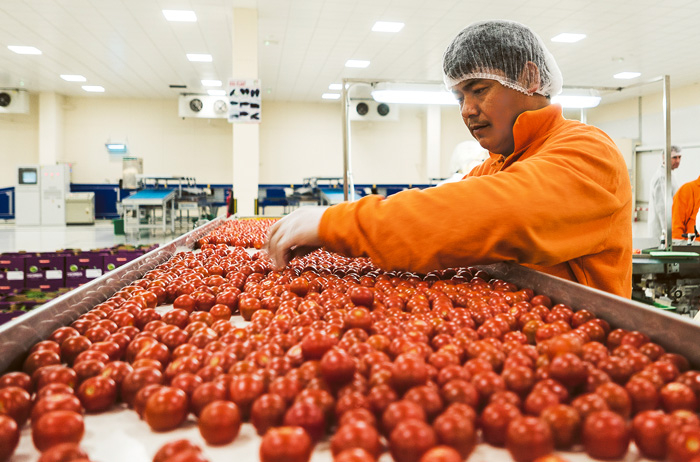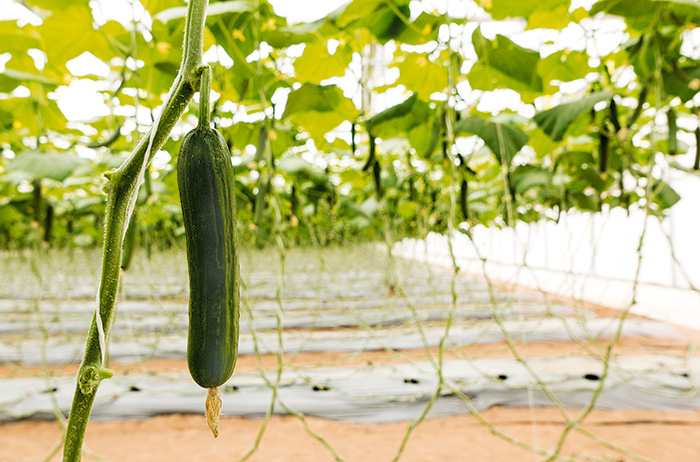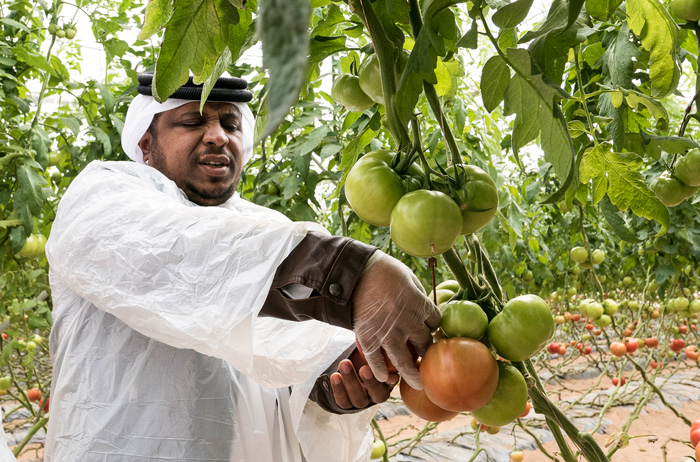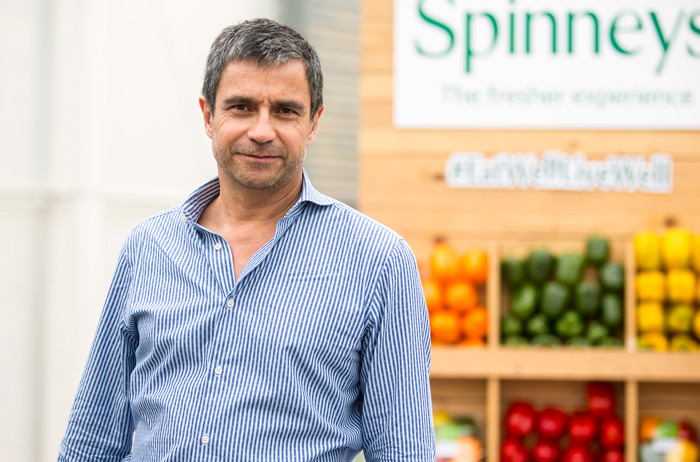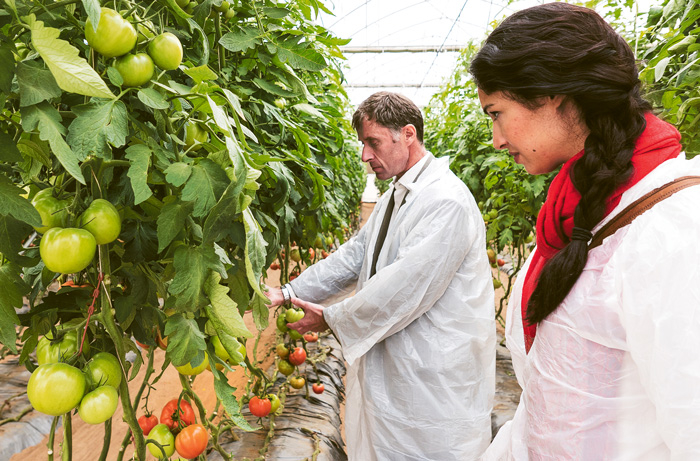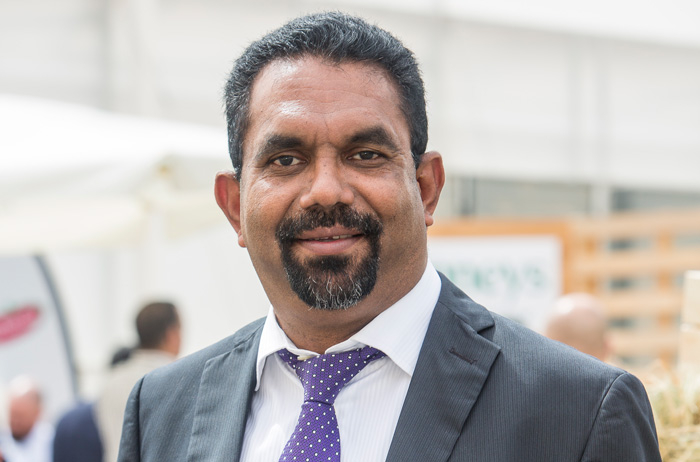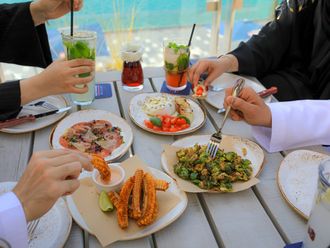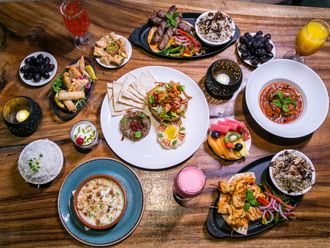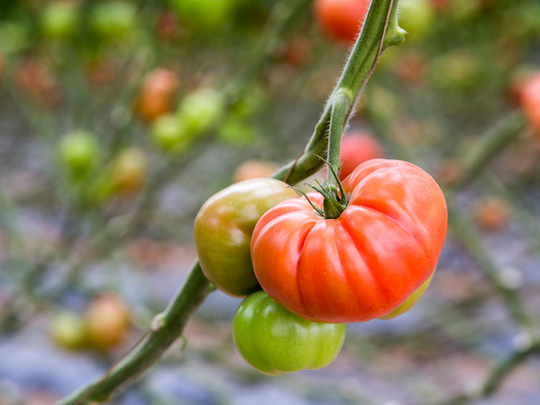
When you pass Coffee Pot Roundabout, you know you’re close to tonight’s dinner. And within minutes, you’re upon it: giant tents sprawl across the desert like something out of an sci-fi movie. Once we’re suitably kitted out in plastic robes — to avoid bringing in new insects — we’re allowed inside the UAE’s biggest plastic structures. Spanning over six thousand square metres each, these greenhouses are home to rows and rows of vines, all rising more than seven feet into the air and fastened above our heads to maximise their output.
That hangs just below eye level: luscious, beefy, giant red tomatoes that are a far cry from the piebald excuses commonly associated with UAE produce. A young woman in our group immediately reaches for one. She cradles it in her hands for several minutes before taking a bite and her face lights up immediately. UAE farmers aren’t just growing beautiful, eye-catching vegetables; clearly they taste as good as they look.
Achieving those results in the middle of the desert — a dream of the nation’s founding President, Shaikh Zayed Bin Sultan Al Nahyan — is as much about farming as about science. While cultivation itself may date back millennia, the techniques in use here at the Elite Agro facility in Al Ain are certainly both scientific and modern. We aren’t at a farm, we’re in a lab.
Precise science
Agriculture Engineer Mohammad Rashid Sulaiman Al Naqbi explains how his team uses everything from solar energy to imported seeds and bumblebees (both from the Netherlands) to improve crop yield at the farm. He breaks down the annual production by volume. Each hectare produces 300 tonnes of tomatoes over the course of a year. Since one kilo is approximately five tomatoes, that’s 1.5 million tomatoes per hectare. The company has 20 hectares under production and grows a range of outdoor and indoor crops, including potatoes and figs.
At Elite Agro, crops — tomatoes, cucumbers and bell peppers — are picked by hand every day and sorted (according to weight, colour, diameter and size) and packaged immediately on site before being bussed to supermarkets around the UAE. This means home chefs and dinner party divas in the UAE can now buy — and cook — produce that’s picked the same day, overturning the idea of fresh food in this desert country.
Agriculture accounts for 0.8 per cent of the UAE’s GDP, or about Dh3 billion in 2015, according to official data.
“Our biggest challenge is the weather,” the UAE national says, explaining how high temperatures and humidity affect the harvest. “If it’s too humid, flowers become sticky and pollination won’t take place. And high humidity is also the best climate for disease. So we’ve got to work to find the right balance.”
The Abu Dhabi-based company was among five finalists for this year’s Tomato Inspiration award, which attracted entries from 50 countries. “We didn’t win,” says Peter Ensor, Sales and Marketing Director of the company’s food and agriculture cluster. “But to have a company competing that is brand new to supplying tomatoes through the year, in the desert, is a big deal.” He says UAE farmers can’t do it without supermarkets. Elite Agro’s produce retails at several nationwide operators, including Spinneys, Carrefour, LuLu and Choithrams, says Sales and Marketing Manager James Verghese.
Teamwork for change
But getting from farm to fork in one day without affecting taste requires working closely with other parts of the food chain. While it may be easier to get Dutch-origin tomatoes in Dubai, consumers must also want to buy them.
Martin Jorge Aguirre, Commercial Manager Fresh Produce at Spinneys, confesses that it’s always been a challenge to get customers to buy local produce — particularly at the premium end. Although consumers are more conscious of the issues associated with freighting in fruit and vegetables from thousands of miles away and are actively searching for locally sourced, sustainably cultivated produce, they’re still being led by their palate. Produce that doesn’t meet the taste test is not going to cross the till. “Last year was the first that we were able to offer local tomatoes over the whole year,” Aguirre says. Over that time, locally grown fruit and vegetables have gone from a 2 per cent share of the sales value of Spinneys’ fresh produce to 8 per cent. “Overall, we’ve seen an increase of sales of local items of over 200 per cent.”
So the brand created the UAE Spinneys Farmers Club. In 2015, the supermarket launched the club with three conventional farmers and four organic producers, including well-known players such as Emirates Hydroponic, Dar Al Fateh and Organic Oasis. The aim was to promote sales of sustainably sourced local produce. Certifications are key to boosting consumer confidence, and Spinneys required club members to meet international standards by getting accredited by organisations such as the NGO Global Gap, or for organic producers, from the EU, USDA or UK’s Soil Association, as well as the UAE’s own Emirates Authority For Standardisation and Metrology.
“With these certifications, Spinneys guarantees that farms are aligned with sustainable agricultural practices [and] taking care of the environment, consumers’ safety and workers’ social aspects,” Aguirre says. In practice, that means farmers are paid a fixed fair price over the production period. To reassure consumers, it retails the produce under its own SpinneysFood label.
Supporting local agriculture isn’t just about weekend trips to farmers’ markets across the UAE — it’s as easy as shopping at your local supermarket. With teamwork, conviction and hard graft, even the desert can bear fruit.



